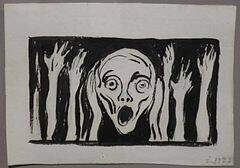Midway through a Psalms-based retreat I was leading for faculty and staff of a Jesuit high school, the young teacher spoke from the back of the room. “How do I explain the ‘fear of the LORD’ to my students?” she asked. “They just don’t get it.” She was right. For most of us, the phrase evokes the vindictive Old Testament deity of Jonathan Edwards and his ilk, those Puritan purveyors of a wrathful God. There is a Hebrew word for such immediate, strong, visceral dread; this is the “terror of the night” against which the Psalmist invokes God’s protection in Psalm 91.
But the fear of the LORD that Isaiah praises in our first reading—a different Hebrew root altogether—is a nuanced, richly expressive term. It is not a command to paralysis, but a summons to right action. It invites us to revere God as all-powerful, all-knowing, all-loving. It encourages us, in the ancient words of Deuteronomy, to walk along the path of the LORD, to love him and to serve him with all our heart and all our soul. As Isaiah, too, makes clear, the way to live out our fear of the LORD is to show compassion for his vulnerable creatures. Are we caring for the poor in our community? Are we helping those we know who are afflicted by suffering? Are we welcoming the stranger into our parish or our neighborhood? Elsewhere in the Bible, we are admonished to be doers of the word, not only hearers. That’s what it means to fear the LORD.
LORD of all creation, Teach me to stand before you with reverence and awe so that I may truly carry out your will. Amen.
For today’s readings, click here.
You can access the complete collection of the Advent 2015 Reflection Series here.
If you would like to receive these reflections via a daily e-mail, contact Elizabeth Kirkland Cahill at ecahill27@yahoo.com








